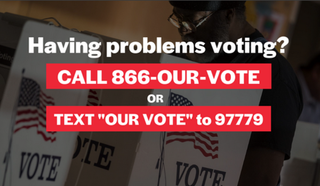Common Cause: Twitter Yanks Election-Meddling Posts

Common Cause said in only a couple of hours it helped get over 2,000 misleading Twitter posts removed Tuesday (Nov. 6) as it monitors Election Day communications and polling places for the crucial midterm elections, looking for attempts to game the system online.
That is in addition to the tech issues with malfunctioning polling machines or electronic poll records that it said have created delays and confusion in some polling places.
On a conference call with reporters to talk about various election flashpoints in terms of voter access, Digital Director Jesse Littlewood said that social media sites including Facebook, Reddit and Twitter have been removing malicious posts "pretty frequently" when brought to their attention.
Littlewood said they were combing through online content via volunteer searches as well as software-based searches and social media monitoring tools. He said they had been identifying problems online, documenting them, then asking social media platforms to remove them.
The social media issues, said Littlewood, fall into two general categories: 1) providing misleading information about when people should vote, for example saying Republicans are voting on Tuesday, Democrats on Wednesday, or vice versa; and 2) warnings about ICE or law enforcement presence at the polls, could depress turnout.
That second category was not so misleading in one instance, Common Cause suggested. It said there was a scheduled, but later canceled, Border Patrol exercise in El Paso that was to have been held near the border but also near a recreation center where many lower income and minority residents were casting their ballots.
Asked to what degree the tech issues with voting machines and e-voter rolls are known mechanical bugs and how much could be security issues—Russian and other foreign state/actor election-meddling remains high on everyone's watch list—director of election security Susannah Goodman had a sobering message: If a malicious nation state actor has put malware in an election management system to change the results and doesn't want to be detected, he won't be.
Broadcasting & Cable Newsletter
The smarter way to stay on top of broadcasting and cable industry. Sign up below
She said that is why the group encourages paper ballots.
In the non-virtual world—Common Cause said it has more than 6,500 volunteer poll monitors—the issues were legion. They included undertrained poll workers leading to delays; poll workers asking for citizenship status; poll workers asking what party a voter was from; confusion over changed polling places; malfunctioning machines or bad ballots; 3-hour waits in Atlanta related to Georgia's exact name match poll ID policy (some voters were turned away or given provisional ballots); e-voter rolls that did not match the reality—voters told they had voted absentee already when they had not; college students being told they could not change their address on Election Day when that was allowed.
Contributing editor John Eggerton has been an editor and/or writer on media regulation, legislation and policy for over four decades, including covering the FCC, FTC, Congress, the major media trade associations, and the federal courts. In addition to Multichannel News and Broadcasting + Cable, his work has appeared in Radio World, TV Technology, TV Fax, This Week in Consumer Electronics, Variety and the Encyclopedia Britannica.

